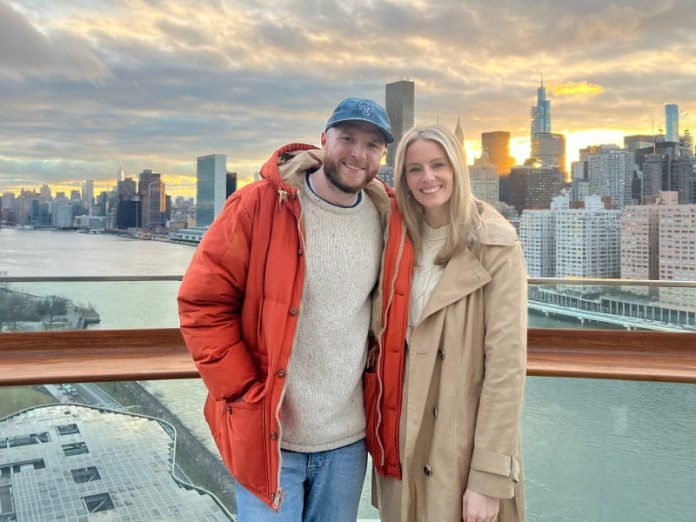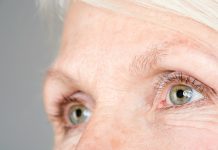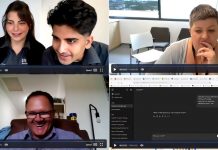
Mike Garrow was 6 weeks old when his mother, Donna, had a stroke. At physical therapy with Mike in tow, she made a remarkable recovery.
When the 30th anniversary of her stroke approached, Mike commemorated it with a tattoo on his right arm of a brain being woven back together.
Although Mike rarely uses Facebook, he posted a photo of his tattoo so family members could see. His Facebook friend Megan Frost also saw the post.
Mike and Megan had never actually met. But in 2009, both had joined a Facebook group for members of the Eastern Connecticut State University freshman class.
It was 2021 when Mike posted about his tattoo. Megan was stunned. For the first time, she realized she wasn’t alone in having a mom who had a stroke at such a young age. Megan’s mom, Colleen, had a stroke when Megan was 7.
So Megan messaged Mike.
Brought together by their shared history as caregivers, a friendship blossomed. Then a romance. They began leaning on and supporting each other as they continued to care for their moms.
Now they’re engaged. Soon, each will call the other’s mom “Mom.”
“We have that unsaid understanding of, I know what you’re going through,” Mike said.
Mike’s story starts on a brisk spring day when his 28-year-old mother, a healthy, active ICU nurse, collapsed while on a walk with Mike in his stroller. A bystander grabbed Mike’s stroller and called 911.
A paramedic received the call for an unresponsive woman. It was Jim Garrow, Mike’s dad and Donna’s husband.
Donna had an ischemic stroke, which means that a clot blocked the flow of blood to her brain. She went into outpatient rehabilitation paralyzed on her right side.
Almost a year later, she left, having regained much of her strength. But she still had a long road ahead.
In high school, Mike was interested in health care. He worked at a post-surgery rehabilitation program. There, he met a stroke survivor who worked with a personal trainer; Mike soon connected his mom with the trainer.
Donna was skeptical at first. But with Mike’s encouragement, she began an exercise program. Donna got stronger, even though she still has trouble with foot drop.
“The gym gave her a place where she gained confidence in herself,” he said.
After college, Mike moved to Ireland to play semi-professional basketball and get his master’s degree in international business. After graduating, he worked for an Irish corporate wellness company.
“I saw my life there,” he said. “I never thought I would end up back in the States.”
But COVID-19 canceled his basketball season and his grandmother’s health had declined. Mike decided to fly home. Within a week, his grandmother died.
Then Ireland closed its borders. Mike decided he wanted to be with his family and moved back to the United States.
Megan, meanwhile, was in second grade when her mom started having reoccurring migraines.
One hot summer day when Colleen was 32, she took her 4-year-old son Tommy and Megan to play at a local lake. Colleen started to feel unwell and wanted to leave.
When they got home, Colleen put Tommy in the bath and began losing her speech. “Watch your brother,” she managed to tell Megan. She then called 911.
Colleen’s stroke was caused by moyamoya disease, a condition in which arteries to the brain narrow and can close, preventing blood from getting to the brain.
Megan’s grandparents arrived from Florida and helped take care of her and Tommy. Eventually Megan, along with other family members, took on the responsibility of being her mother’s caregiver.
From the start – while she was recovering in the hospital – Colleen told Megan not to treat her differently.
“It’s something I’ve very much taken to heart,” Megan said.
After many years of physical, speech and occupational therapy, Colleen is paralyzed on the right side of her body, walks with a brace and lives independently. Her stroke caused aphasia, which makes it hard to communicate.
“My mom and I have a special way of communicating,” Megan said. “It makes me comfortable knowing Mike can communicate well with her – so well that at times he’ll even finish her sentences.”
During her freshman year at Eastern Connecticut State, Megan played sports, as did Mike. Yet their paths never crossed. She then transferred to the University of Connecticut for her sophomore year.
She later earned a master’s degree in human resource management and was living and working in New York City while also helping her mom in Connecticut. She’d never joined support groups or even come across anyone else who could relate to her experiences.
“I just naively assumed there was no one else in the world whose mother had a stroke and went through what I did,” she said. “Until I read that post.”
In her 2021 Facebook message to Mike, Megan told him her story. She also presumed he’d felt as isolated as she had, so she emphasized that he should no longer feel like he’s alone.
Mike wrote back right away. “Oh, I know I’m not alone,” he wrote.
Mike knew it because he’d long ago thrown himself into the stroke world. He read everything he could about strokes, sought guidance, then pursued a career in health care.
He’d just started a new job as a digital product manager at a major health care company and he’d launched a podcast with a stroke survivor who’s now a close friend.
He wanted to meet Megan – and not only to share stroke caregiving stories. “I thought, ‘She’s really cute. Let’s see what happens,'” he said.
Megan approached dinner and drinks as a meeting, not a date. But there was immediate chemistry. They talked about their travels, work and activities they liked to do. What they didn’t talk about? Their moms.
“We had so many things in common,” Mike said.
A second meeting, this time a date, happened soon after. Then another.
It turned out that they didn’t have to talk too much about their history with their moms because there was an unspoken understanding of what each had gone through, a refreshing change from past relationships with people who couldn’t relate.
“It was really comforting knowing he just got it,” Megan said.
Donna and Colleen met and hit it off, too.
Last December, Mike surprised Megan with a birthday trip to Germany, where she has family.
On the way to her birthday dinner, they went to take pictures at the Hofgarten, a large garden and park in Munich. That’s where Mike proposed, and Megan said yes.
Now, the two live together in Connecticut, near Colleen. They’re in the midst of wedding planning.
They’re passionate about sharing the message that both stroke survivors and caregivers can benefit from connecting with people in their same age group.
It’s helped their mothers, and it’s helped them, too. The support Mike and Megan found in each other has given them strength.
“We know it’s only going to get more challenging as the years go by,” Mike said, “but we do it together now, as a team.”
Written by Deborah Lynn Blumberg.
If you care about stroke, please read studies about how to eat to prevent stroke, and diets high in flavonoids could help reduce stroke risk.
For more information about health, please see recent studies about how Mediterranean diet could protect your brain health, and wild blueberries can benefit your heart and brain.
Follow us on Twitter for more articles about this topic.



